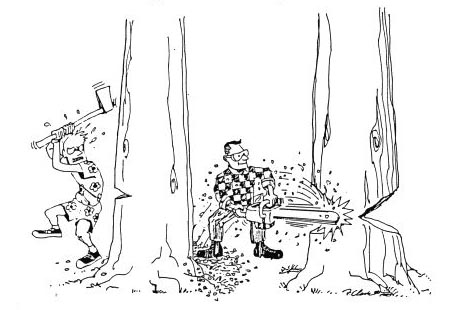Skills and Strategies
for Effective Learning
What do you think about these two ways to cut
a tree?

One man is working hard, but is not productive in making fast progress.
The other is working smart by using an effective tool, and is getting results!
This page shows you ideas for "getting results" that
will
help you more fully enjoy the great adventure of learning.
Learning Skills — for Now and for Life
One of the most valuable things a
teacher can do is to help students prepare for lifelong learning. Improved
learning skills — concentrating, reading and
listening, remembering, using time, and more — are immediately useful and
will continue paying dividends for a long time.
Motivations and Learning Strategies
Personal motives for learning can
be immediate or long-term, extrinsic or intrinsic. You may be eager to learn
because it's fun now, or it will be useful later, or both. When students
discover that it's fun to learn and think, they'll want to do it more often and
more skillfully! The master skill of "learning how to learn" is
illustrated with true stories (why employers hired an unconventional worker,
and how I didn't learn to ski) in Effective Learning - Motivations and Strategies for Personal Education. Problem Solving & Metacognition in Education has summaries of these ideas, and much more.
A related master skills are metacognition & knowing how to learn plus associated ideas-and-skills: motivation, self-efficacy, self-regulation, formative feedback.
Study Skills & Thinking Skills
for Effective Learning
study
is "the process of applying the mind in order to acquire
knowledge" (Webster's Dictionary) so study skills are
learning skills that are also thinking skills when
study includes "careful attention to, and critical
examination and investigation of, a subject."
Of course, we don't want to "learn"
things that are not useful or are simply wrong (are not true) since our main
problem,
as noted by Mark Twain, is "what we know that just
ain't so." Therefore, we should wisely evaluate ideas
with critical thinking.
We can also explore strategies (and attitudes) for generating ideas with
creative thinking.
And learning, both individual and collective, can be improved by disciplined
methods
for effectively using these
thinking skills and problem-solving strategies as in design process and scientific
method.
Learning Skills — Web
Resources
Dartmouth College offers useful information
and advice for Maximizing
Your Academic Experience including handouts, videos, links, and more.
The University of Texas (at Austin)
shares their learning
skills handouts to help you (or your students) improve their Learning Strategies &
Skills,
for Writing, Reading, Math/Science, Graduate Exam/Placement Test Preparation,
English
as a
Foreign
Language, Life
Management,
and Learning Difficulties. This page also has links, in the left margin,
to services for UT students, faculty, visitors, and staff.
Test
Anxiety & Optimal Performance — with principles that are also useful
for most non-exam situations in life.
Skills & Strategies
for Effective Learning is a collection of useful ideas —
gathered by Craig Rusbult (editor of this website) from a variety of books —
about memory, concentration, active reading and listening, exam preparation & performance,
and wise use of time.
The Critical Thinking Community
offers
guidelines for How
to Study and Learn (Parts 1 & 2) and more.
Generally,
learning skills that are effective in college (at Dartmouth, Texas, and elsewhere)
are also effective
for younger students; "learning skills strategies" designed
specifically for younger students (in high school, middle school, and elementary
school)
will be here by November 2010.
Because learning and thinking
are closely related, modern
theories of learning (constructivism,...) emphasize the importance of THINKING
when we learn.
A
WebSurfing Tip: You probably know this already, but usually you can
find various levels of home-pages in a website by gradually "stripping
off" the end of the URL after each slash ( / ). For example, you'll
see a content-page followed by three home-pages when you begin with "http://www.dartmouth.edu/%7Eacskills/success/time.html"
and strip off "time.html" (then press
RETURN) and remove "success/" (press
RETURN) and remove "%7Eacskills/" (press
"RETURN).
There is an abundance
of resources on the web. I prefer to offer you selectivity
(as in the top part of this page) with only high-quality resources, but —
if you don't mind feeling overwhelmed and you're willing to do your own "selecting"
— an awesomely comprehensive website, with 1700 pages in 55 categories
of learning skills, was researched by the chemistry students of Wilton High
School,
guided by their teacher, the late Dr. Bob Jacobs: Chemistry
Coach (for Learning Skills,...)

This website for Whole-Person Education has TWO KINDS OF LINKS:
an ITALICIZED LINK keeps you inside a page, moving you to
another part of it, and
a NON-ITALICIZED LINK opens another page. Both keep everything inside this window,
so your browser's BACK-button will always take you back to where you were. |
This homepage for Learning Skills,
written by Craig Rusbult, with cartoon by Frank Clark, is
http://www.asa3.org/ASA/education/learn/study-skills.htm
All links on this page were checked-and-fixed on
January 1, 2011.
Search the Website



